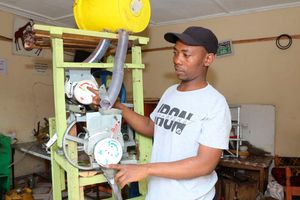
The back of the new cultivator tractor that was developed by Nyandarua National Polytechnic.
Controlling weeds has remained a huge challenge to small, medium and large-scale farmers, making some to limit the size of land under crops.
Agriculture experts say though using herbicides is cheaper than manual weed control, the chemicals are a health hazard, especially if the users do not follow the manufacturers’ guidelines.
A new and affordable and weed control mini-tractor will now do the job in just two hours for an acre at Sh3,500.
The motorcycle engine-driven tractor can equally till your land with less emissions and cheaply, compared to ordinary machines.
The tractor is a product of Nyandarua National Polytechnic.
Simon Mwangi, an Irish potato and maize farmer, has used the mini-tractor for the last two seasons to till his land and control weeds.
“The tractor is cheaper and more effective than herbicides and manual weeding. Using labourers is expensive while chemicals come with many challenges. Some herbicides work but others don’t. The chemicals also pose a health risk to the user and his or her family,” Mwangi says.
“Still, the chemicals could destroy important crops. The farmer must spray some distance from the base of the plant, meaning the additional cost for labourers to heap soil around the base of the plant and manually remove the weeds between plants.”
To till an acre manually, Mwangi divided his farm into portions of 15 by 15 metres, totalling 18 pieces.
He would then pay Sh300 to a labourer to cultivate a piece, spending at least Sh5, 400.
Still, the casual labourers would take several days to complete the work.
“The cultivating tractor is becoming popular in this region as it is efficient and helps cut production costs. I used it to weed during the short rains and later cultivated my three-acre maize farm in less than a day,” says Stella Wangui, another farmer in Ol Kalou.
Nyandarua County Agriculture Mechanisation Officer, Kariuki Njung’e, admits that many large and small-scale farmers use herbicides to control weeds as experience has shown that doing that reduces production costs.
The agricultural officer also attributes the use of herbicides to lack of specialised weeding equipment not just in Nyandarua and surrounding counties but Kenya as a whole.
“Herbicides kill many important organisms that inhabit the soil. If the land is on a slope and there is a water source nearby, the chemicals will end up there,” Njung’e says.
“That means the harmful chemicals will end up in the bodies of people and livestock. The herbicides could also harm the person applying them, especially if he or she does not have personal protection equipment or wears it inappropriately.”
With herbicides, one can spray an average of five acres a day.
Njung’e says a shortage of weeding equipment compels many farmers to turn to herbicides.
“Mechanised agriculture focuses on using tractors for ploughing virgin land, harrowing, chiselling and ridging,” he says.
“Mechanisation is the way to go as it is safe. The devolved government has invested in mechanised agriculture, with equipment being leased at subsidised charges.”
Nyandarua County Environment and Climate Change Director, Kyambia Mwanzia, says constantly using pesticides, herbicides, fertiliser and other chemicals has negative effects on the environment, including soil degradation and contamination of rivers, lakes and groundwater.
He says it may also kill useful plants and animals
“Some chemicals pollute the air and contribute to greenhouse gas emissions. Global warming is real. The chemicals kill beneficial insects, birds and pollinators like bees, disrupting ecosystems. There are human health risk issues as chemical residues in food and water are responsible for respiratory problems, cancer, hormonal imbalances and other conditions,” Mwanzia says.
“Overuse of pesticides and herbicides leads to resistance in pests and weeds, requiring stronger chemicals over time, thus making the problem even worse. We need to avoid using these chemicals.”
James Mwangi, a trainer at the Nyandarua National Polytechnic Department of Mechanical Engineering, says the cultivator can be used on any farm with crops planted in rows.
The small tractor is designed in a way that it heaps soil on the base of the plant.
As the tractor moves, it cuts the soil between the rows, effectively removing weeds.
It consumes minimal fuel as the engine is that of a motorcycle. The tractor has gears to give it more power or reduce the power when need arises.
The trainer says the engine of the small tractor uses only two litres of petrol for an acre and encourages individual farmers, groups and institutions to purchase it.
The owner of the tractor receives Sh300 for every acre weeded, Mwangi says.
“Farming comprises several stages, starting with primary cultivation. It should be noted that the cultivation stage is very important because it eliminates unwanted crops. This helps prevent competition for nutrients – a factor that determines harvest per acre,” the trainer says.
Nyandarua National Polytechnic came up with the idea of the small tractor in 2009. However, it was not until early last year that the implement passed the necessary tests.
It has now been taken up by farming families in the greater Rift Valley, Central and Western Kenya, with one tractor going for Sh350,000.









